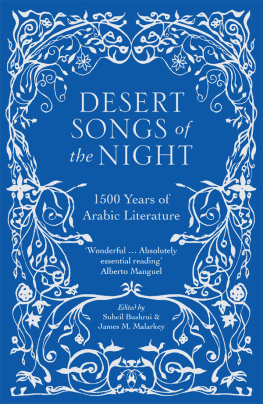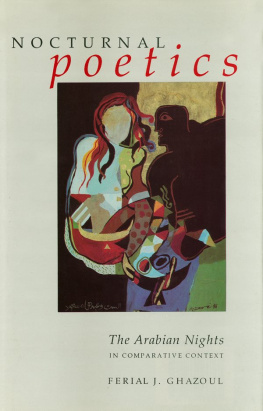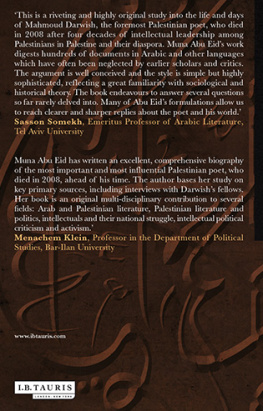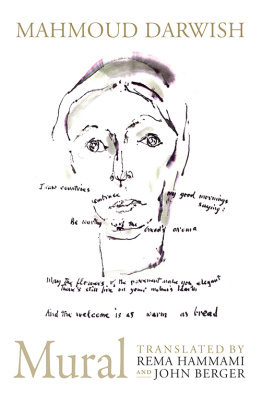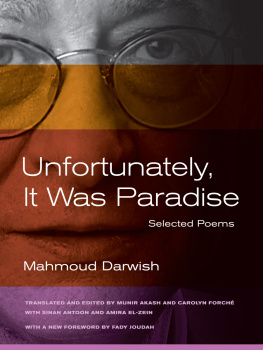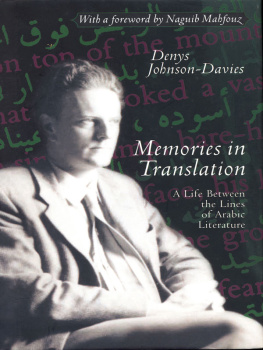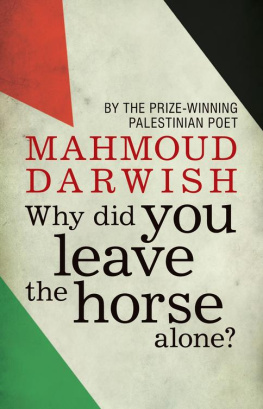Desert Songs of the Night

Desert Songs of the Night is a wonderful introduction to fifteen centuries of a literature still largely unknown in the West, without which much of our civilizations would not have developed as they have, from the rediscovery of Aristotle by Arab commentators to the lyric poetry of Europe, from the magical world of the Arabian Nights to the modern revolutionary poets of Palestine. Absolutely essential reading for our troubled times. Alberto Manguel
At a time when the world obsesses over violence and bloodletting in the Arab world, this remarkable anthology, which spans 1,500 years of Arab literary genius, is a stark reminder that there exists an untold story we keep missing about the region. Hanan al-Shaykh
Desert Songs of the Night
1500 Years of Arabic Literature
Edited by Suheil Bushrui & James M. Malarkey
In collaboration with C. Bayan Bruss
SAQI
For Abdul Rahman Muhammad Moumena
In grateful recollection of his generous
support and inspiration
Published 2015 by Saqi Books
Copyright Suheil Bushrui and James M. Malarkey 2015
ISBN 978-0-86356-175-7
eISBN 978-0-86356-185-6
All rights reserved. No part of this book may be reproduced or transmitted in any form or by any means, electronic or mechanical, including photocopying, recording or by any information storage and retrieval system, without permission in writing from the publisher.
Every reasonable effort has been made to obtain the permissions for copyright material reproduced in this book. If any have been inadvertently overlooked, however, the publishers will correct this in future editions.
A full CIP record for this book is available from the British Library.
Printed and bound by CPI Group (UK) Ltd, Croydon, cr0 4yy
SAQI
26 Westbourne Grove, London W2 5RH
www.saqibooks.co.uk
Blood relations we may lack,
But literature is our adopted father.
Abu Tammam (c. 805845)
CONTENTS
INTRODUCTION
The Importance of Arabic Literature
In their Introduction to The Arab World: Forty Years of Change, American anthropologists Elizabeth and Robert Fernea remark that the people of the Middle East still remain as distant from the American public as they were nearly a half a century ago, when the authors underwent their first fieldwork experience in southern Iraq. Nowadays, media and film may convey more images of Arabs, yet, as the Ferneas comment, The very nearness of the television images, presented without explanation or background, accentuates the differences between us and them; they dress differently, look different, and seem to worship a different god. This was in 1997. Since then, benefiting from increased media resources and the intensification of electronic communication, it is easy to presume that the public is now far better served and informed. In fact, unlike the years prior to 9/11, scarcely a day goes by when the public does not hear in the news terms such as Arabs, Muslims, Iraqis, and Palestinians, not to mention Saudis, Egyptians, Lebanese, Jordanians and Syrians and, sometimes, Gulf Arabs or Tunisians, Libyans and Algerians. Far more is also heard about Arab immigrants in Europe and America most often in terms of problems they pose instead of gifts they bring.
There may now be more press reports and books about the Arab world than ever before, but in spite of this sheer volume, scarcely any of the news speaks well of this region or its people, which, in effect, is mostly known for its turmoil and troubles. Aside from the many inspiring stories and hopeful signs that initially appeared during the Arab Spring, the content of typical coverage today repeats a pattern of predictable themes: brutal violence of which Arabs are either perpetrators or victims; political negotiations virtually always leading to nowhere; speeches by Arab leaders either taken too seriously or dismissed too readily; and now the latest reports on the Islamist jihad, the refugee crisis, and new flare-ups in the Israeli-Palestinian conflict. The current civil wars and political crises in the heart of the Arab world have indeed further fuelled this negative imagery of a region appearing to seethe with violence and bloodshed, with instability spreading beyond borders, and democracy, peace and justice an ever more distant dream.
However, in our judgment, in spite of this expanded coverage of sensational events, if anything, the general public may have acquired only an illusion of greater insight and understanding due to the continual coverage of volatile events and the crisp summations of our self-assured pundits. Aside from recognizing that serious problems do persist in that part of the world, we are obliged to question how well current media coverage actually can reveal the full complexity of reality. Pertaining to this anthology, how might an acquaintance with Arabic literature help the reader enter the far more nuanced heart of Arab experience and aspiration? Scholars have long known that if students, workers and citizens want to get beyond stereotypes, there are two essential pathways that have been tested and proven over time. Each path involves displacement, receptivity and sustained engagement.
The first way is the oldest: the path of travel, encounter, making acquaintances, seeing the landscapes and taking stock of how people live their lives including what they live for, what they fear as well as what they want and need. One must inhabit their world with a disinterested frame of mind to comprehend the rationale behind customs and beliefs that may at first appear alien and feel awkward. This path of learning requires continual involvement in daily life as well as assiduous study of language, culture, religion and history. With patience and persistence, the rewards are usually mutual enrichment and friendship as well as improved means for discussing conflicting viewpoints and interests.
Early Muslims had become aware of these benefits of travel as the empire expanded and contact with other cultures increased. Cartographers, geographers and historians such as al-Masudi (known as the Herodotus of the Arabs) al-Bakri, al-Idrisi, Ibn Batuta and Leo Africanus left vivid and valuable accounts of their journeys from Africa to Asia. By the 17th century Christian and Muslim Arabs were venturing to Europe, preceding, in effect, the stream of travellers who would soon move in the reverse direction as Europe was expanding to the East during the 19th century. Some of these European pioneers of travel writing and ethnography include Richard Burton, Freya Stark, Gertrude Bell, Charles Doughty, T. E. Lawrence, Carleton Coon and Wilfred Thesiger.
The works of these authors still merit re-reading for their infectious curiosity, vivid portrayals and accurate renditions of life and talk during generations past. They eagerly sought to master the language and to accurately depict the culture. They often expressed respect and admiration for the Arabs, particularly for their physical hardiness, expansive hospitality, nobility of bearing and devotion to honour. Having spent months, if not years, on the ground among Arabs, they were able to skirt stereotypes while conveying the uniqueness of individuals and settings. The convulsive events from the Ottoman Empire through the two World Wars have profoundly reshaped the Middle East and affected how its inhabitants see the world. Yet, the most faithful echo of the many dilemmas, struggles and dislocations of the Arabs over this past century is found in their literature as well as in their private conversations.

